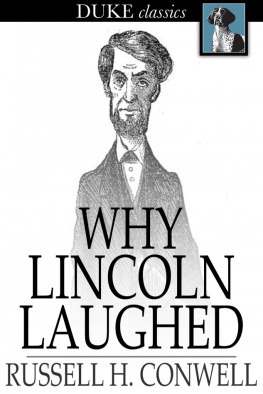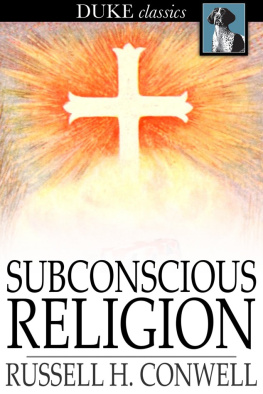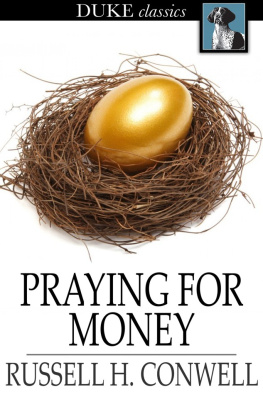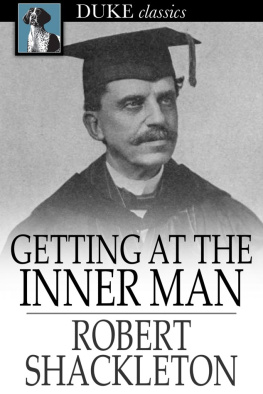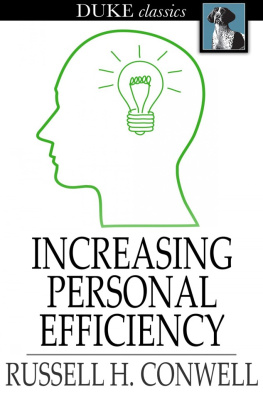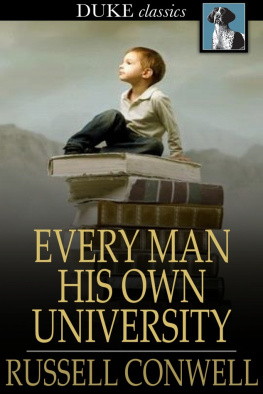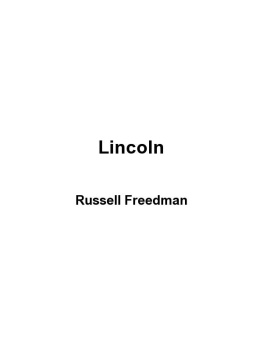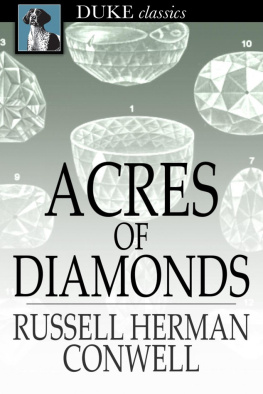Russell H. Conwell - Why Lincoln Laughed
Here you can read online Russell H. Conwell - Why Lincoln Laughed full text of the book (entire story) in english for free. Download pdf and epub, get meaning, cover and reviews about this ebook. year: 2015, publisher: Duke Classics, genre: Detective and thriller. Description of the work, (preface) as well as reviews are available. Best literature library LitArk.com created for fans of good reading and offers a wide selection of genres:
Romance novel
Science fiction
Adventure
Detective
Science
History
Home and family
Prose
Art
Politics
Computer
Non-fiction
Religion
Business
Children
Humor
Choose a favorite category and find really read worthwhile books. Enjoy immersion in the world of imagination, feel the emotions of the characters or learn something new for yourself, make an fascinating discovery.
- Book:Why Lincoln Laughed
- Author:
- Publisher:Duke Classics
- Genre:
- Year:2015
- Rating:4 / 5
- Favourites:Add to favourites
- Your mark:
- 80
- 1
- 2
- 3
- 4
- 5
Why Lincoln Laughed: summary, description and annotation
We offer to read an annotation, description, summary or preface (depends on what the author of the book "Why Lincoln Laughed" wrote himself). If you haven't found the necessary information about the book — write in the comments, we will try to find it.
Though he would later achieve widespread acclaim as a popular minister and writer, when he was a young man serving in the Union army, Russell Conwell had a chance encounter with then-President Lincoln. Over the course of their conversation, Conwell was able to gain a great deal of insight into Lincolns unique personality and sense of humor. His recollections of their chat are presented in this charming volume.
Why Lincoln Laughed — read online for free the complete book (whole text) full work
Below is the text of the book, divided by pages. System saving the place of the last page read, allows you to conveniently read the book "Why Lincoln Laughed" online for free, without having to search again every time where you left off. Put a bookmark, and you can go to the page where you finished reading at any time.
Font size:
Interval:
Bookmark:

First published in 1922
ISBN 978-1-63421-433-9
Duke Classics
2015 Duke Classics and its licensors. All rights reserved.
While every effort has been used to ensure the accuracy and reliability of the information contained in this edition, Duke Classics does not assume liability or responsibility for any errors or omissions in this book. Duke Classics does not accept responsibility for loss suffered as a result of reliance upon the accuracy or currency of information contained in this book.
Abraham Lincoln wrote to his law partner, William Henry Herndon, that "thephysical side of Niagara Falls is really a very small part of that world'swonder. Its power to excite reflection and emotion is its great charm."That statement might fittingly be applied to Lincoln himself. One wholived in his time, and who has read the thousand books they say have beenwritten about him in the half century since his death, may still bedissatisfied with every description of his personality and with everyanalysis of his character. He was human, and yet in some mysterious degreesuperhuman. Nothing in philosophy, magic, superstition, or religionfurnishes a satisfactory explanation to the thoughtful devotee for theinspiration he gave out or for the transfiguring glow which at timesseemed to illumine his homely frame and awkward gestures.
The libraries are stocked with books about Lincoln, written by historians,poets, statesmen, relatives, and political associates. Why cumber theshelf with another sketch?
The answer to that reasonable question is in the expressed hope that greatthinkers and sincere humanitarians may not give up the task of attemptingto set before the people the true Lincoln. One turns away from everyvolume, saying, "I am not yet acquainted with that great man." Hence,books like this simple tale may help to keep the attention of readers andwriters upon this powerful character until at last some clear andsatisfactory portrayal may be had by the interested readers among allnations.
Neither bronze nor canvas nor marble can give the true image. Perhaps themore exact the portrait or statue in respect to his physical appearancethe less it will exhibit the real personality. All pictures of AbrahamLincoln fail to represent the man as he was. The appearance and thereality are at irreconcilable variance.
Heredity may be a large factor in the making of some great men, andeducation may be the chief cause for the influence of other great men. Butthere are only a few great characters in whose lives both of thoseadvantages are lost to sight in the view of their achievements.
Genius is often defined with complacent assurance as the ability anddisposition to do hard work. That is frequently the truth; but it is notalways the truth. Abraham Lincoln did much of many kinds of hard work, butthat does not account for his extraordinary genius. He had the least toboast of in his family inheritance. His school education was of the mostmeager kind, and he had more than his share of hard luck. His mostdifficult task was to overcome his awkward manners and ungainly physique.His life, therefore, presents a problem worthy the attention ofphilanthropic scientists.
Can he be successfully imitated? Why did his laugh vibrate so far, and whywas his humor so inimitable? If the suggestions made in this book will aidthe investigator in finding an answer to these questions it will justifythe venturesomeness of this volume in appearing upon the shelf with such agreat company of the works of greater authors.
RUSSELL H. CONWELL.
PHILADELPHIA, January, 1922.
Lincoln loved laughter; he loved to laugh himself and he liked to hearothers laugh. All who knew him, all who have written of him, from JohnHay, years ago, to Harvey O'Higgins in his recent work, tell how, in thedarkest moments our country has ever known, Lincoln would find time toillustrate his arguments and make his points by narrating some amusingstory. His humor never failed him, and through its help he was able tobear his great burden.
I first met Lincoln at the White House during the Civil War. To-day itseems almost impossible that I shook his hand, heard his voice, andwatched him as he laughed at one of his own stories and at the writings ofArtemus Ward, of which he was so fond. Yet, as I remember it, I did notfeel at that time that I was in the presence of a personality soextraordinary that it would fascinate men for centuries to come. I was ayoung man, and it was war time; perhaps that is the reason. On thecontrary, he seemed a very simple man, as all great men areI mightalmost say ordinary, throwing his long leg over the arm of the chair andusing such commonplace, homely language. Indeed, it was hard to be awed inthe presence of Lincoln; he seemed so approachable, so human, simple, andgenial.
Did he use his humor to disarm opposition, to gain good will, or to throwa mantle around his own melancholy thoughts? Did he believe, as Mark Twainsaid, that "Everything human is pathetic; the secret source of humor isnot joy, but sorrow?" I am sure I cannot say. I only know that humor toLincoln seemed to be a safety valve without which he would have collapsedunder the crushing burden which he carried during the Civil War.
Until he was twenty-four and was admitted to the bar, he was a quiet,serious, brooding young fellow, but apparently he discovered theeffectiveness of humor, for he began using it when he was arguing beforethe court. Some of his contemporaries say that he was humorous in theearly part of his life, but that, as time went on and he gained confidencethrough success, he used humor less and less in his public utterances.This is partly true, for there is no trace of humor in his presidentialaddresses. But that he was humorous in his daily life and that hecontinued to read and laugh over the many jokes he read is too obvious todeny. You cannot think of Lincoln without thinking at the same time ofthat very American trait which he possessed and which seems to spring fromand within the soil of the landhomely humor.
One day when I was at the White House in conversation with Lincoln a manbustled in self-importantly and whispered something to him. As the manleft the room Lincoln turned to me and smiled.
"He tells me that twelve thousand of Lee's soldiers have just beencaptured," Lincoln said. "But that doesn't mean anything; he's the biggestliar in Washington. You can't believe a word he says. He reminds me of anold fisherman I used to know who got such a reputation for stretching thetruth that he bought a pair of scales and insisted on weighing every fishin the presence of witnesses.
"One day a baby was born next door, and the doctor borrowed thefisherman's scales to weigh the baby. It weighed forty-seven pounds."
Lincoln threw back his head and laughed; so did I. It was a good story.Now what do you think of this? Only recently I picked up a newspaper andread that same Lincoln anecdote, and it was headed, "A New Story."
It was in connection with a death sentence that I first went to call uponPresident Lincoln. This was in December, 1864. I was a captain then in aMassachusetts regiment brigaded with other regiments for the work of theNorth Carolina coast defense, under command of Gen. Benjamin F. Butler. Ayoung soldier and boyhood playmate of mine from Vermont had been sentencedby court martial to be shot for sending communications to the enemy. Whathad actually happened was this. The fighting at that time in our part ofthe country was desultorya matter of skirmishes only. As must inevitablyhappen, even between hostile bodies of men speaking the same language, acertain amount of "fraternizing" (although that word was not used then)went on between the outposts and pickets of the opposing forces. In somecases the pickets faced one another on opposite sides of a narrow stream.Often this would continue for days or weeks, the same men on the sameposts, and something very like friendshipthe friendship of respectfulenemieswould spring up between individuals in the two camps. They wouldsometimes go so far as to exchange little delicacies, tobacco and thelike, across the line, No Man's Land, as it was called in the last war. Insome places the practice actually sprang up of whittling little toy boatsand sailing them across a stream, carrying a tiny freight. This act wasusually reciprocated to the best of his pitiful ability by Johnny Reb onthe opposite bank.
Font size:
Interval:
Bookmark:
Similar books «Why Lincoln Laughed»
Look at similar books to Why Lincoln Laughed. We have selected literature similar in name and meaning in the hope of providing readers with more options to find new, interesting, not yet read works.
Discussion, reviews of the book Why Lincoln Laughed and just readers' own opinions. Leave your comments, write what you think about the work, its meaning or the main characters. Specify what exactly you liked and what you didn't like, and why you think so.

